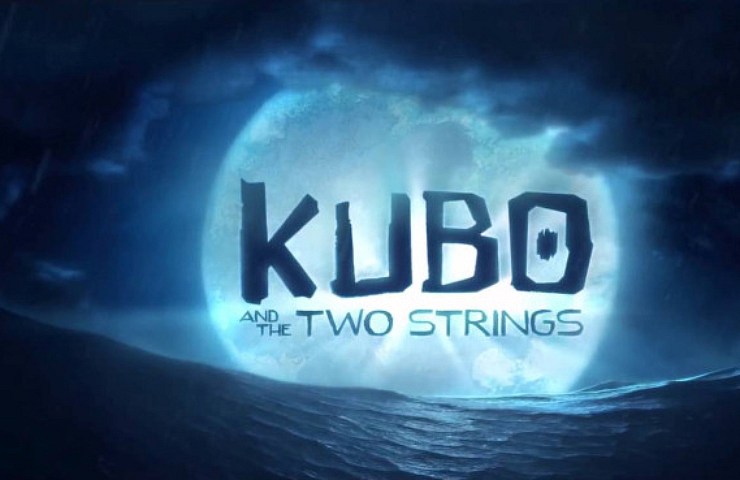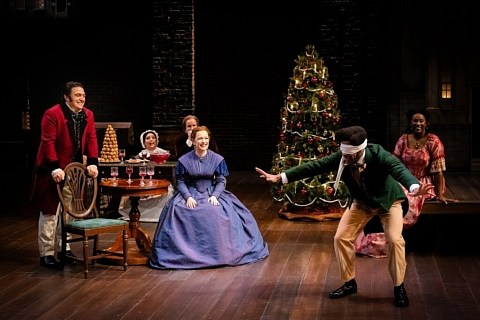Blink now while the previews are still playing—allow nothing to distract your attention from what is possibly the next Oscar winner for Best Animated Feature.
It might be a bit early for the champagne since the 89th Academy Awards is still six months away, but Laika’s latest film contains acclaim in every frame. Other than continuing with gorgeous, inventive stop-motion, “Kubo and the Two Strings” features the richest, deepest and most heartfelt narrative the Oregon-based animation house has ever explored.
In a cave on top of a hill that greets the sun lives Kubo (Art Parkinson), his ailing-but-loving mother and a magical shamisen. Not only does the three-string instrument—no, the title isn’t a mistake, as the hero’s action during the climactic fight will prove—can give life to the origami paper acting out Kubo’s tales and entertain the villagers, it will also be a major player in the boy’s quest to find his fallen father’s sacred armor. This setup alone guarantees an entertaining, opening-night kind of affair for the family, but writers Marc Haimes and Chris Butler (from a story by Haimes and Shannon Tindle) have fashioned a tale that is fitting for all times and ages.
Similar to Laika’s first two projects, a tinge of darkness dwells in “Kubo”‘s vivid colors and liveliness. But rather than employing it for cute shock value as “Coraline” did, or just lightly touching upon it by characterizing “ParaNorman”‘s protagonist as an outcast-turned-hero, here it reflects a few of life’s harsh brushes such as mortality, a sense of incompleteness and adversaries who are family. Aside from the number of hours and the level of effort spent to produce a stop-motion film, it’s astounding to see a feature-length project engage this weighty notion with utter confidence and balance.
That’s not saying “Kubo” doesn’t know how to be funny. Dotted throughout and surfacing at proper points in Kubo’s journey is the overprotective Monkey (Charlize Theron), delivering stitch-inducing humor that channels her stringent nature as a protective charm. Another companion of Kubo, the warrior Beetle (Matthew McConaughey), is an effective foil to Monkey as his aloofness is designed to take advantage of the Texan actor’s laid-back, pre-“Lincoln Lawyer” attitude. Even with eerie Noh masks and spine-tingling sound design, The Sisters—along with their voice actress (Rooney Mara)—relish at being evil; there is detectable satisfaction in their desire to claim Kubo’s remaining eye and purging his mother to please The Moon King (Ralph Fiennes).
As these characters share who they are and why they do things, the film’s commentary on the value of storytelling comes forward. Within “Kubo,” stories are seen uplifting lives, unlocking the past as guidance for the future, healing an inner bruise, deceiving someone to destroy them or, yes, to make them better. Some aspects are portrayed with more subtlety than others, but under the spirited direction of Travis Knight (the CEO of Laika) all of them are delivered with utmost creativity: on a firefly-laden oasis; amid angry waves that eager to devour a leafy galleon; through autumn leaves gliding over a fire or, like what the film’s printed-in-3-D, made-from-resin elements are imitating, the origami papers which constantly fold and unfold.
All the beauty, however, can’t dress up the confined scope and stilted nature stop-motion technology can’t help but contribute to action sequences. Knight and company have tried to smooth out more kinetic set pieces with editing, but awkward pacing still plagues Kubo’s battles with a ginormous skeleton or a menacing worm-like creature. It’s also quite awkward to realize that, even though their vocal performances are sublime, Theron, McConaughey, Mara and Fiennes are here strictly for star power, while equally well-known and setting-appropriate performers like Cary-Hiroyuki Tagawa and George Takei are in exceedingly minor roles.
But composer Dario Marianelli and cinematographer Frank Passingham use their respective talents with outstanding verve, so much so that—as the most-skilled storytellers are capable of doing—the level of dazzlement never dips and the rough edges become immaterial. Marinelli’s score, either with a rousing orchestra or a lone shamisen, is always an accommodating teammate to Passingham’s framing choices. Even without dialogue, “Kubo” could still achieve a hypnotic, poetic quality.
After a summer of large-scale hits making timid bites, Laika’s fourth film is a breeze that delivers the epic adventure it advertises and afterward reaches into the heart. Similar to other contemporary gems about storytelling, last year’s graceful “Mr. Holmes” or the touching “Big Fish” are the firsts to come to mind, “Kubo and the Two Strings” ensures the listeners’ sitting is always comfortable as the character begins his journey.
Kubo and the Two Strings
Art Parkinson (Kubo), Charlize Theron (Monkey), Matthew McConaughey (Beetle), Rooney Mara (The Sisters), Cary-Hiroyuki Tagawa (Hashi), George Takei (Hosato)
Directed by: Travis Knight (debut film)
Written by: Marc Haimes (“Johnny Frank Garrett’s Last Word”), Chris Butler (“ParaNorman”)
Music by: Dario Marianelli (“Anna Karenina”)
101 min., PG
Release date: Aug. 19
9 out of 10.





Recent Comments